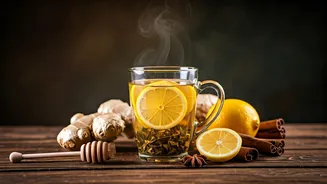Boosting Your Immunity
The first step in tackling the flu involves bolstering your immune defenses. One of the most effective strategies is adequate rest; the body repairs itself
and fights off infections more efficiently when well-rested. Aim for 7-9 hours of sleep each night. Hydration is another cornerstone; drinking plenty of fluids, such as water, herbal teas, and clear broths, helps to thin mucus and prevent dehydration. Incorporating vitamin C-rich foods, like citrus fruits, berries, and leafy greens, can strengthen the immune system, as vitamin C acts as a potent antioxidant. In addition, consider taking a zinc supplement, as zinc has been shown to reduce the duration and severity of cold and flu symptoms. A diet rich in whole, unprocessed foods will provide the body with essential nutrients for optimal immune function. Prioritizing these steps prepares the body to effectively combat the flu.
Garlic's Antiviral Abilities
Garlic, a common kitchen staple, is renowned for its antiviral properties. It contains allicin, a compound that has demonstrated effectiveness in fighting various viruses, including those responsible for the flu. To harness garlic's benefits, consider incorporating it into your diet. Add raw garlic to your meals, such as salads or soups, or consume garlic supplements. However, it's worth noting that high doses of garlic might lead to digestive discomfort. Another option is a garlic-infused honey mixture, which is known for its soothing properties. The honey not only provides a pleasant taste but also has its own antibacterial benefits. Using garlic strategically can provide a natural way to mitigate flu symptoms and boost the body's defenses.
Ginger's Soothing Powers
Ginger is another powerful natural remedy, primarily valued for its ability to alleviate nausea and reduce inflammation. Ginger contains gingerol, an active compound with potent anti-inflammatory and antioxidant effects. Many people find that ginger tea can soothe a sore throat and provide relief from nausea, a common symptom of the flu. Making ginger tea is straightforward; simply steep fresh ginger slices in hot water. For added benefits and taste, you can add honey and lemon. Ginger can also be consumed in other forms, such as grated into meals or taken as a supplement. Regular consumption of ginger may help decrease inflammation throughout the body, providing relief from body aches and pains associated with the flu. Ginger's versatility makes it a valuable aid in managing flu symptoms.
Honey for Relief
Honey is a well-established remedy for coughs and sore throats, offering relief through its soothing properties. Its thick consistency coats the throat, calming irritation. Additionally, honey has natural antibacterial and antiviral qualities. For coughs, a simple remedy is to take a spoonful of honey directly or mix it in warm water or tea. When using honey, it is crucial to use high-quality, raw honey, which retains more of its beneficial compounds. This also gives the best results. Honey should not be given to children under one year old due to the risk of botulism. For adults and older children, honey offers a gentle and effective way to relieve flu-related coughs and sore throats.
Steam Inhalations
Steam inhalation is a simple yet effective technique for clearing nasal passages and easing congestion. The warm, moist air helps to loosen mucus, making it easier to breathe. To do this, fill a bowl with hot water, add a few drops of eucalyptus or tea tree essential oil (optional), and lean over the bowl with a towel draped over your head to trap the steam. Inhale deeply for 10–15 minutes. Alternatively, you can take a hot shower and breathe in the steam. This method helps to moisten the respiratory tract, providing relief from congestion. Steam inhalation can be particularly beneficial at bedtime, helping to ease breathing and promote better sleep when battling the flu. Ensure you are careful to avoid burns when working with hot water.
Echinacea's Benefits
Echinacea, a popular herbal remedy, is recognized for its potential to boost the immune system and reduce the duration of cold and flu symptoms. This herb stimulates the activity of immune cells, helping the body to fight off infections. Echinacea is available in various forms, including teas, tinctures, capsules, and lozenges. When using echinacea, it's essential to follow the recommended dosages and duration of use. Some studies have indicated that starting echinacea at the onset of symptoms can be most effective. While echinacea is generally considered safe, some individuals may experience mild side effects, such as upset stomach. Speak to a doctor before starting to take Echinacea, especially if you have other health issues or take medication.
Elderberry for Flu
Elderberry is another natural remedy that has gained popularity for its antiviral properties. Elderberries contain antioxidants and compounds that may help prevent the flu virus from entering cells, reducing the severity and duration of symptoms. Elderberry is commonly consumed as syrup, lozenges, or gummies. Research suggests that taking elderberry syrup early in the course of the flu can shorten the illness duration. It is advisable to consult a doctor before using elderberry, particularly for children, pregnant or breastfeeding women, or those on other medications. Quality elderberry products are often combined with other immune-boosting ingredients like zinc and vitamin C, thereby amplifying their effectiveness. Using elderberry can provide a helpful natural way to support immune function during the flu season.
Saline Nasal Rinse
A saline nasal rinse is a simple and effective method for clearing nasal passages and relieving congestion caused by the flu. It works by flushing out mucus, allergens, and other irritants from the nasal cavity. You can use a neti pot or a saline nasal spray for this purpose. When using a neti pot, it is crucial to use distilled or sterilized water to avoid introducing bacteria into the nasal passages. Lean over a sink, tilt your head, and gently pour the saline solution into one nostril, allowing it to flow out the other. Repeat on the other side. Saline nasal sprays offer a convenient and easy-to-use alternative. These rinses can help alleviate congestion, allowing for easier breathing and reducing the severity of flu symptoms. Regular use can keep nasal passages clear and prevent the buildup of mucus.
Vitamin D's Role
Vitamin D plays a critical role in immune function, and maintaining adequate levels can help ward off the flu. It helps to regulate immune responses and supports the body's ability to fight off infections. Vitamin D can be obtained through sunlight exposure, certain foods like fatty fish and egg yolks, and supplements. During the flu season, particularly for those with limited sun exposure, taking a vitamin D supplement may be beneficial. If you are uncertain about your vitamin D levels, a blood test can help determine if supplementation is needed. Ensure that you consult with a healthcare professional regarding the appropriate dosage, as excessive vitamin D intake can cause adverse effects. Maintaining healthy vitamin D levels can be a good defense against the flu.
Probiotics for Recovery
Probiotics, beneficial bacteria that support gut health, can also play a role in flu recovery. They help to maintain a healthy balance of bacteria in the gut, which in turn can boost the immune system. When the body is fighting off the flu, the immune system becomes strained, and probiotics can assist in this regard. You can consume probiotics through fermented foods, such as yogurt, kefir, and sauerkraut, or through probiotic supplements. Ensure you pick a high-quality probiotic with various strains of bacteria. Consider adding probiotics to your routine to fortify your immune system and ease recovery when battling the flu. Regular consumption of probiotics can improve gut health, which is essential to overall immune function and faster recovery.























